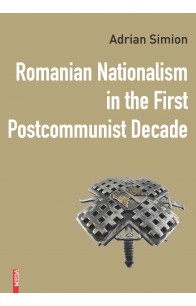Rezultate căutare pentru 'Adrian Arde��'
Romanian nationalism has been and it still is a research topic that has generated and still generates various controversies, both at the level of the opinions of the authors who have dealt with this subject, and at the level of the interpretations that the reader can have on such a topic. And the analysis of the evolution of Romanian nationalism since 1989 is a theme that can be included in this framework of different, and sometimes even contradictory, approaches. Moreover, any analysis of post-communist Romanian nationalism may have its limitations, in terms of the authors’ approaches, and because, in general, approaches to nationalism have a certain potential for inaccuracy. The nationalist phenomenon is very complex because it refers to the people (the nation) and the country and quite often the boundary between nationalism and patriotism, for example, is quite weak. And in the Romanian case, things were even more complicated, both because the nationalism responded to a need for homogeneity existing in the post-communist Romanian society, and because the Romanian nationalism had a specific and quite complex typology.
In this paper, we referred more to those aspects that looked at the presence of nationalism in areas such as society, culture, religion or interethnic relations. Moreover, the period chosen for the study was rather a delicate one, considering the fact that the last decade of the twentieth century was, for Romania, a period of search of the road that the country needed to straighten, after half a century of totalitarian regime. And studying nationalism in such a historical context may have different interpretations, especially since post-communist Romanian nationalism, as some Romanian authors have stated, could be considered as paradigmatic for nationalism in general, because of its subtlety and complexity. (from the „Introduction”)
Țara Năsăudului este una dintre micro-regiunile României care s-a bucurat de o atenţie ştiinţifică aparte, nu doar din partea istoricilor, ci dinspre întregul spectru al ştiinţelor umaniste şi sociale. Bibliografiile istorice ale României au acumulat, volum de volum, numeroase titluri dedicate temei: fie cărţi, fie studii şi articole provenite atât din periodice ştiinţifice locale, cât şi din principalele reviste de istorie din centrele universitare sau din diverse volume de studii. Această valoroasă literatură ştiinţifică a devenit în timp tot mai amplă, solicitând cercetătorilor, şi mai ales cercetătorilor debutanţi, un efort consistent de documentare bibliografică.
Organizarea şi activitatea Regimentului 17 (2 românesc) de graniţă pe teritoriul năsăudean au legat acest spaţiu de ansamblul istoriei Monarhiei habsburgice într-un mod mai intim şi pe alocuri chiar mai spectaculos decât alte regiuni locuite de români. (din „Introducere”)
SOMMAIRE
Alexander Baumgarten, Le reste comme problème de la philosophie
I. Figurer le reste
Luigi Tassoni, La poetica delle somiglianze. Milo De Angelis dalle rovine del soggetto alle tracce del riconoscimento
Corin Braga, Le centre structurel et ses restes
Giovanni Rotiroti, Per una poetica e una politica dei resti a partire da Urmuz: il caso di Tristan Tzara, Eugène Ionesco, Paul Celan e Gherasim Luca
Antonio Patraș, The Anecdote in The History of Romanian Literature from Its Origins to the Present
Ligia Tudurachi, « Jouets », « boîtes », « reliques ». Fascination du petit chez Hortensia Papadat-Bengescu
George Alexandru Condrache, The Residual Forms in Contemporary Central European Literature. Two Case Studies: Bohumil Hrabal and Ádám Bodor
II. Le continent de la non-lecture
Horea Poenar, Glitches of the Archive: On the Relation Between Memory and the Commons
Catherine Gravet, Dépouiller des archives pour éditer des textes « résiduels » : le cas Alexis Curvers
Florin Oprescu & Monica Oprescu, Mateiu Caragiale – Through the Leftovers’ Glass. From the Journal to Ephemerides
Gabriela Glăvan, Communist Leftovers: The Forgotten Books of Gellu Naum
Eugen Radu Wohl, Ion D. Sîrbu’s Anthumous Works as (Re)valuable Residues
Levente T. Szabó, Dilettantism as a Moral Panic. Recovering a Forgotten Discourse of Hungarian Literary Modernization]
Corina Croitoru, Le résidu du résidu : ombres de la poésie roumaine de guerre
Roxana Patraș, When All That Rests Is Literature: Traces, Transcriptions and Remnants of Great Speeches
Arina Neagu, Une autre approche sur les mémoires roumains de prison : le caractère résiduel de « l’indicible concentrationnaire »
Barbara Miceli, How to Turn a Forgotten Figure of American History into a National and Gender Emblem: Joyce Carol Oates’s Treatment of Mary Jo Kopechne in Black Water
III. Identités en marge
Marie Vrinat-Nikolov, Les langues ignorées de l’espace littéraire bulgare
Annalisa Cosentino, La boemia altrove
Marius Popa, Le classicisme français dans la critique littéraire de la génération roumaine de 1848. Radiographies d’un « malentendu »
Lavinia Sabou, The Travel Accounts We Don’t Write About. Eastern European Ways of Mapping the World
Ruxandra Cesereanu, Societal Metabolism and “Excretion”: Towards a Typology of Marginals (The Fiction of Venedikt Yerofeyev, Alexander Zinoviev and Roberto Bolaño)
IV. Survivances
Monica Fekete, La rigenerazione del poema cavalleresco: da centro epico-narrativo a margine del moderno, da trionfo idealistico a spazio del romanzo contemporaneo
Laura Marin, Survivances du neutre
Márta Zabán, Residual Nationalism. The Nineteenth-Century Hungarian Folk Drama as a Reinterpretation of European Theatrical Nationalism. Pour une politique du résiduel en littérature
Ioana Bot, Gli esordi dimenticati della stilistica: Leo Spitzer, censore dei soldati italiani nei campi di prigionia della Prima Guerra Mondiale
Elena Crașovan, (Mis)readings of Contemporary Magical-Realist Fiction in the Context of Romania’s 2000 Literary Generation. The Case of Bogdan Popescu
Adriana Stan, Monuments of Literature, Scraps of Criticism
V. Entretiens: Ioana Bot, What’s Left? A Discussion on the Remains of Writing – and the Remains of Living – with Two European Authors




